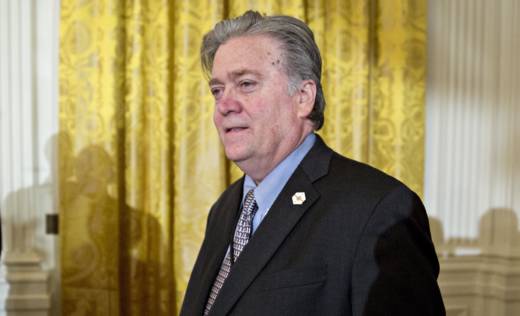Bannon took over as Trump's campaign chairman a year and a day ago, and he was credited with bringing much-needed focus and discipline to what had been a seat-of-the-pants operation. Bloomberg Businessweek writer Joshua Green argues that without Bannon's skill at mobilizing disaffected white male voters, "I don't think Donald Trump would have been elected president."
The president, who doesn't like sharing the spotlight, often bristled at news stories that painted Bannon as the mastermind of his unlikely 2016 victory.
"Mr. Bannon came on very late, you know that," Trump told reporters at his New Jersey golf resort on Tuesday. "I went through 17 senators, governors, and I won all the primaries. Mr. Bannon came on very much later than that."
Trump offered only a half-hearted defense of his chief strategist, who has had a target on his back ever since joining the administration.
"I like him. He's a good man. He is not a racist, I can tell you that," Trump said. "But we'll see what happens with Mr. Bannon."
Long before he had a formal role in the campaign or the administration, Bannon had been a cheerleader for Trump as head of Breitbart News. Bannon took control of the website in 2012 and turned it into a platform for the "alt-right." His nationalistic, anti-immigrant and anti-Muslim views proved a good match for Trump's.
"I'm an economic nationalist," Bannon told the Hollywood Reporter shortly after the November election. "The globalists gutted the American working class and created a middle class in Asia. The issue now is about Americans looking to not get f—ed over."
The take-no-prisoners style that was so successful during the campaign proved a liability, however, after Trump and Bannon reached the White House. The original shock-and-awe travel ban spearheaded by Bannon was quickly rejected by federal courts. His efforts to strong-arm lawmakers into passing a repeal of the Affordable Care Act backfired. And Bannon feuded openly with other White House staffers, including Jared Kushner, the president's son-in-law, National Security Adviser H.R. McMaster and National Economic Council Director Gary Cohn.
"Bannon really believes this stuff to a degree that's almost scary," Joshua Green told Fresh Air's Terry Gross. "I think that Trump is driven mainly by opportunism, by a desire to pursue whatever is going to get Donald Trump positive coverage on cable news now. And during the campaign, when nationalism — when Bannon's nationalism seemed to work for him, that was what he would espouse. But when that stopped working for him in February, after he became president, he was happy to bring in people [like McMaster and Cohn] who nationalists abhor."
Bannon raised eyebrows earlier this week when he granted an unsolicited interview to The American Prospect, a liberal magazine.
Although he was one of the few White House staffers who embraced the president's remarks on Charlottesville, Bannon dismissed the white nationalists at the center of the violent protests as a "fringe element," "losers" and a "collection of clowns," in the interview, published Wednesday.
It was a surprising comment from a man who successfully harnessed white nationalism, first at Breitbart and later in the Trump campaign.
Bannon argued that it's self-defeating for Democrats to overplay the race card.
"If the left is focused on race and identity, and we go with economic nationalism, we can crush the Democrats," Bannon told The American Prospect.
Green suspects Bannon "will keep fighting for this idea of an anti-immigrant nationalism, come hell or high water."
But now he'll be pursuing that agenda from outside the White House. And possibly taking aim at his former rivals on the inside.
